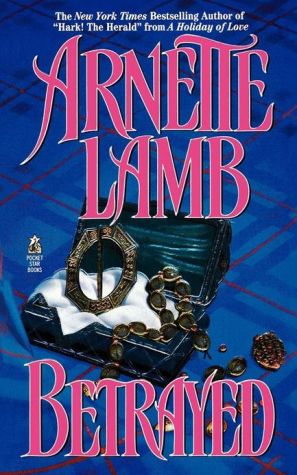
Preview Betrayed
Sarah believes herself to be the love child of the duke of Ross. But the discovery that no noble blood runs in her veins devastates her and she flees to Edinburgh. Now, she's falling prey to the charms of a man after her dowry. But what started as an ill-fated and deceptive romance is blossoming into a passionate union.
From Publishers WeeklySarah MacKenzie has always known that she is the bastard child of Lachlan, Duke of Ross (from Highland Rogue). That's why it comes as quite a shock when Lachlan tells her that Neville Smithson, the local sheriff, was in fact her father. Betrayed and brokenhearted, Sarah sets off to Edinburgh, in the hopes that her efforts to open an orphanage will ease her pain. Feisty Sarah has other problems as well, for she had promised to wed Henry Elliot?that is, before he was jailed for gambling debts. Lady Emily Elliot, Henry's mother, simply can not abide losing Sarah or rather the substantial dowry the Elliots need so desperately. So, when Lady Emily's handsome second son, Michael, returns home after years with the East India Company, Lady Emily charges him with wooing and winning the stubborn but most attractive Sarah. Michael finds himself not only drawn to her, but aiding in her plans for the orphanage. Some authors use small children as devices to fill gaps in weak plots, but Lamb's young secondary characters are entertaining, endearing and comic. Nominated for two Romantic Times awards, Lamb is an author whose star is said to be on the rise. In fact, her star has already risen and continues to shine brightly.
Copyright 1995 Reed Business Information, Inc.
All of Scotland is aware of the unconventional MacKenzie household. All of Scotland accepts that Lachlan MacKenzie is raising his four bastard daughters and that none of them have the same mother. All of Scotland acknowledges the fact that Sarah MacKenzie is the bastard daughter of Lachlan MacKenzie, duke of Ross. All of Scotland is wrong. When Sarah learns that she possesses not a single drop of MacKenzie blood, she is devastated and runs to her betrothed in Edinburgh. Unfortunately for Sensible Sarah, Henry has been imprisoned for failing to honor a gambling debt. When Henry's mother, Lady Emily, countess of Glenforth, demands that Sarah turn over her dowry to Henry so that he can pay his debt and get out of prison, Sarah vows to let Henry rot in prison and she turns her attention and affections to the orphans of Edinburgh. Her struggles to provide the children of the streets with a place to live, combined with Lady Emily's poison tongue, have her at constant odds with the good people of the town. Michael Elliot was born a second son. Abandoned to the family's country estate by his mother, Lady Emily, and ignored by his father, Michael was raised an orphan. Realizing that his brother Henry will receive everything the family name provides, Michael eventually joins the East India Company and makes a fortune through shrewd investments and frugal living. Returning home to the family he barely remembers, he is shocked when his mother suggests he woo Sarah's dowry from her so that dear Henry can make proper use of it. Familial duty compels Michael to give it a try, regardless how distasteful he finds the task. In Betrayed, Arnette Lamb once again provides evidence of her skill. With heart-warming characters that also manage to be outrageously funny, she ensures that the reader will keep turning those pages. Add to that her ability to bring the reader into the story and Betrayed will have the reader feeling as if she too had something to do with the events. Arnette Lamb deserves the praise she's going to get for this one.Watch out for Notch and his band of orphans. Under the influence of Arnette's pen, these kids will steal your heart while you're not looking! Upon finishing an Arnette Lamb story, the reader should be prepared for long bouts of wishing her next release were already out! Ms. Lamb has penned a beautiful love story, heavy on the humor. Exactly how I like them!Gerrie Shepard -- Copyright © 1994-97 Literary Times, Inc. All rights reserved -- From Literary Times
